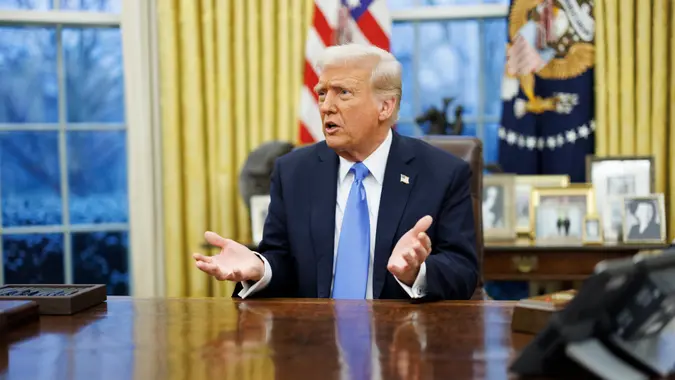Trump Economy: 4 Ways Financial Deregulation Could Impact Middle-Class Investors

Commitment to Our Readers
GOBankingRates' editorial team is committed to bringing you unbiased reviews and information. We use data-driven methodologies to evaluate financial products and services - our reviews and ratings are not influenced by advertisers. You can read more about our editorial guidelines and our products and services review methodology.

20 Years
Helping You Live Richer

Reviewed
by Experts

Trusted by
Millions of Readers
The middle class could see significant changes in how they save and invest as President Donald Trump prioritizes financial deregulation during his second term.
Looser rules for banks, retirement accounts, lending and investment vehicles might mean lower fees and easier access to credit. However, these changes could also increase risks to middle-class investors’ savings, retirement and homeownership goals.
In the Trump economy, financial deregulation could impact middle-class investors in four key ways.
Enhanced Credit Access
Banks and other financial institutions may be more willing to offer loans to middle-class families by easing lending regulations.
“Financial deregulation could make it easier for the middle class to access credit,” said Joe Camberato, CEO of National Business Capital. “Right now, banks are buried under so many rules that it’s tough to borrow money unless you’re getting a mortgage, car loan or credit card. If things loosen up, banks could offer more flexible lending options, helping more people buy homes, start businesses or invest in their future.”
However, Christopher Stroup, founder and CEO of Silicon Beach Financial, said relaxed banking rules and easier access to credit could also present risks for middle-class investors.
“It may also lead to higher interest rates or less favorable terms,” Stroup said. “Middle-class borrowers should carefully review the costs and terms of any credit they access.”
More Investment Opportunities
Wayne Winegarden, an economist at the Pacific Research Institute, said financial deregulation will give the middle class more investment options, improving their ability to grow a nest egg.
“The same goes for the current interest rate environment,” Winegarden said. “With higher rates on savings and CDs, middle-class families have more access to financial instruments while taking on less risk.”
Camberato said one of the biggest roadblocks for middle-class investors is the “accredited investor” rule, which requires a net worth of more than $1 million or an individual income of more than $200,000 in each of the previous two years, with a “reasonable” expectation of the same in the current year.
“This rule was meant to protect people from risky deals, but it also keeps regular investors from accessing potentially lucrative investments,” Camberato said. “If those rules change, more people could invest in private equity, real estate deals, or startups.”
Potential Lower Costs
Deregulation can reduce businesses’ compliance costs, which could lower the prices of everyday items and increase middle-class consumers’ purchasing power.
“Most regulation increases costs and reduces options for consumers, as big and well-funded companies are the only ones that can afford to comply with the regulations,” said Rod Skyles, a blogger at The Unconventional Economist.
“By reducing regulations and if that is combined with a higher level of transparency, prices go down as new providers can enter the marketplace,” Skyles said. “New competition almost always results in innovations, which tend to lower costs and increase opportunities.”
More Alternative Options
Stroup said a more relaxed regulatory environment could make alternative investment options, such as private equity, cryptocurrencies or nontraditional assets, more accessible.
“However, these products could carry higher risks, so middle-class investors should carefully consider the potential rewards versus the dangers of such options,” Stroup said.
While middle-class investors could gain access to more investment options, including alternative ones, they should also be aware of the risks, he added.
“Investors should watch for changes in fee structures, conflicts of interest and transparency,” Stroup said. “If regulations loosen, financial advisors may have fewer obligations to act in clients’ best interests. Choosing an advisor with a fiduciary duty is important to ensure impartial, client-first recommendations that align with your best interests.”
 Written by
Written by  Edited by
Edited by 

























